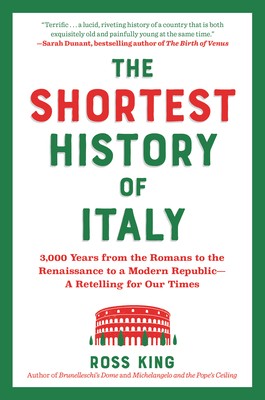
- We will send in 10–14 business days.
- Author: Ross King
- Publisher: Experiment, LLC
- ISBN-10: 1891011456
- ISBN-13: 9781891011450
- Format: 13.2 x 19.7 x 1.9 cm, minkšti viršeliai
- Language: English
- SAVE -10% with code: EXTRA
Reviews
Description
The calendar. The Senate. The university. The piano, the heliocentric model, and the pizzeria. It's hard to imagine a world without Italian influence--and easy to assume that inventions like these could only come from a strong, stable peninsula, sure of itself and its place in the world. In this breakneck history, bestselling author Ross King dismantles this assumption, uncovering the story of a land rife with inner uncertainty even as its influence spread.
As the Italian tale unfolds, prosperity and power fluctuate like the elevation in the Dolomites. If Rome's seven hills could talk, they might speak of the time of Trajan, when nearly one million people lived in a glorious version of The Eternal City--or they might bemoan the absence of life five hundred years later, when conquest and the Bubonic Plague brought Rome's population below forty thousand. Widely known episodes of wealth like the First Triumvirate and the time of the Medicis are given fresh life alongside thorough descriptions of other periods less heralded, but equally important: The Middle Ages, the early days of Venice, the invasion of Napoleon, and the long struggle for unification. Along the way, King investigates:
- Why the fall of the Romans was not quite a bang or a whimper
- Why the years called the "Dark Ages" more than deserve their name
- How a unique baptism led to the proliferation of the café
- How a small-town secretary became the principal founder of Fascism
- Author: Ross King
- Publisher: Experiment, LLC
- ISBN-10: 1891011456
- ISBN-13: 9781891011450
- Format: 13.2 x 19.7 x 1.9 cm, minkšti viršeliai
- Language: English English
The calendar. The Senate. The university. The piano, the heliocentric model, and the pizzeria. It's hard to imagine a world without Italian influence--and easy to assume that inventions like these could only come from a strong, stable peninsula, sure of itself and its place in the world. In this breakneck history, bestselling author Ross King dismantles this assumption, uncovering the story of a land rife with inner uncertainty even as its influence spread.
As the Italian tale unfolds, prosperity and power fluctuate like the elevation in the Dolomites. If Rome's seven hills could talk, they might speak of the time of Trajan, when nearly one million people lived in a glorious version of The Eternal City--or they might bemoan the absence of life five hundred years later, when conquest and the Bubonic Plague brought Rome's population below forty thousand. Widely known episodes of wealth like the First Triumvirate and the time of the Medicis are given fresh life alongside thorough descriptions of other periods less heralded, but equally important: The Middle Ages, the early days of Venice, the invasion of Napoleon, and the long struggle for unification. Along the way, King investigates:
- Why the fall of the Romans was not quite a bang or a whimper
- Why the years called the "Dark Ages" more than deserve their name
- How a unique baptism led to the proliferation of the café
- How a small-town secretary became the principal founder of Fascism


Reviews